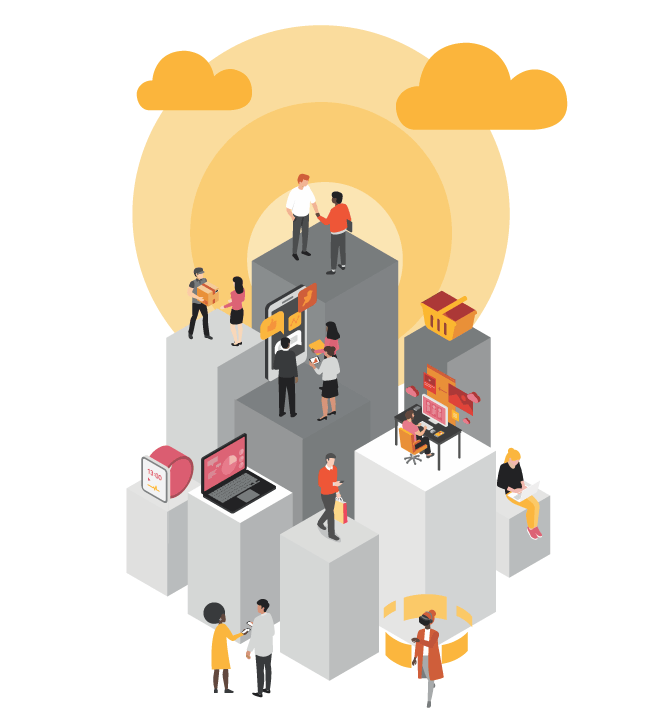How to take your CRM software to the next level
The challenge:
New opportunities for you and your customers regularly emerge with the constant evolution of Customer Relationship Management (CRM) software. Consumers quickly become accustomed to innovations and immediately adopt them as the new standard for the future.
To expand your customer base and strengthen your existing relationships, you need to differentiate yourself from the norm and create a superior customer experience. Intelligent and integrated interactions in real-time characterise a customer experience that is both unique and increases profits. But to achieve this, your CRM software must have the necessary technological capabilities.
The solution:
We support you as a competent partner with our best-practice expertise. Guided by your corporate strategy, we focus on your end users' customer experience to design a solution with the right CRM sofware for your company.
We show you all the suitable technological options that enable an intelligent and integrated customer experience. Our team can implement them efficiently for you at the highest level - from the company-wide holistic introduction of a CRM system to area-specific modernisations and developing custom solutions for highly specific challenges.

Let us help you renew and revitalise your CRM system and processes. Reach out today to find out more.
Our CRM software implementation and modernisation services
SAP Customer Experience (CX) Consulting
Our SAP Customer Experience consulting services build on a unique end-to-end service offering. They span from an initial assessment of your situation to customised implementation and after-go-live support. Our services include CRM best practices consulting, teaching agile working methods, change management and training. Besides the core CRM consulting topics, our PwC network enables us to offer services beyond this, such as strategy consulting, UX design, or legal advice in data protection.
Our services are tailored to a broad range of requirements, and our experts have the knowledge and experience to apply them to your scenario.
Find out more about our services in detail here or contact us via our contact form for a personal introduction.
Our BXT approach for successful CRM system transformation
Business
How can added value be created for your company?
eXperience
What is the best user experience?
Technology
How do we realise it?
The strategy sets the tone
We use industrial and functional expertise to support the most relevant concepts.
Focus on the experience
People-centred thinking engages and inspires all individuals and breathes life into concepts.
Technology supports the implementation
We combine the necessary technologies into a platform with the best concepts to create a roadmap.
The advantages for you and your customers
Modernising your CRM software opens many benefits for you and your customers.
The possibilities by area
Each area of CRM has specific requirements. A CRM system needs certain functionalities to master them. In the following overview, we list these challenges and explain how you can overcome them.
The challenges in marketing
Classical marketing measures are becoming less and less effective, and the standards for modern marketing methods are continuously evolving and becoming more demanding. To reach your leads and customers and exploit the opportunities of digital and data-driven marketing, you must overcome the following challenges:
Current challenges:
- How do I make better use of the quality of my customer profiles to increase their meaningfulness?
- How can I increase the efficiency of my marketing planning and implementation?
- How can I reach potential customers precisely, across channels and at the right time along the customer journey?
- How can I implement professional and efficient lead and account-based marketing to increase my conversion rate in all markets?
- What insights will accelerate my decision-making, and how can data-driven marketing enable a more efficient customer approach?
- How can I use AI technology for my marketing performance?
- How do I realise a short go-to-market phase to act flexibly?
SAP Marketing Cloud can meet these challenges head on in the B2B and B2C environment, while Emarsys is designed specifically for the B2C markets.
We would be happy to inform you about the details, possibilities, and advantages in a non-binding discussion. We analyse your digital marketing’s maturity with you to create data-driven marketing by combining business, experience, and technology knowledge.
SAP Marketing Cloud for B2C and B2B enables:
- Advanced customer profiling
With SAP Marketing Cloud, you can build comprehensive customer profiles based on various sources. - Efficient marketing planning and implementation
From planning budgets to preparing and executing campaigns to evaluating metrics, holistic control is possible. - Cross-channel customer experience
Consider online and offline channels, social media, and more channels. - Lead- and account-based marketing in B2C and B2B
The system allows the individual targeting of leads and accounts. - Data-driven marketing
Based on data analysis and evaluation, carry out precise customer targeting and achieve greater campaign efficiency.
The Emarsys Customer Engagement Platform for B2C enables:
- Hyper-personalised customer experiences
Data-driven marketing logic orchestrates all customer touchpoints, supporting highly personalised customer experiences. - Out-of-the-Box marketing tactics
Specific strategies and use cases are predefined in Emarsys. - Integrated marketing analytics
Predefined strategy-based analytics and KPIs. - AI-based Omni channel marketing
Channel-independent personalisation using AI is enabled. - Short implementation time
Rapid deployment and short time-to-market.
Why PwC?

To the point:
- PwC delivers successful SAP Customer Experiences projects from strategy to execution from a single source.
- We can access on a global network of experts quickly and efficiently to identify and implement a solution to your technology or management challenges.
- We follow the BXT approach and our goal is always to add value to the business, enhance the user experience and enable implementation in technology.
- Our integrated change management focuses on increasing user qualifications and acceptance of new solutions.
- We ensure short times to introduce new systems thanks to our agile implementation approach.
Customer Transformation
We transform business models for sustainable customer growth.
Want to learn more?
Insight into our work at Customer Transformation.
Contact us

















